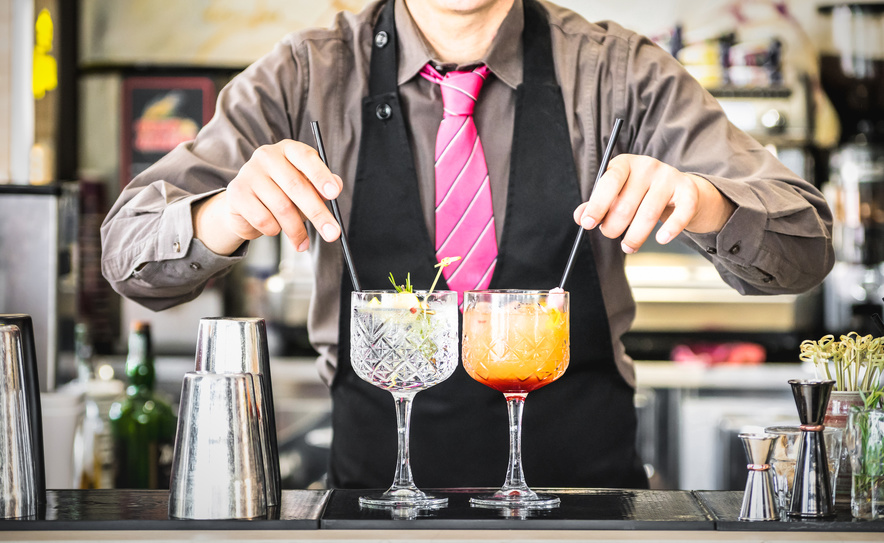Bartending has evolved into a sophisticated craft that extends far beyond the simple act of pouring drinks. Today, bartenders are regarded as mixologists, artisans who blend creativity with precision to craft exquisite cocktails. As the demand for skilled and specialized bartenders continues to rise, so does the popularity of specialized bartending courses.
These courses offer aspiring bartenders a deeper understanding of mixology, spirits, and customer service, providing a unique and competitive edge in the industry.

Understanding the Basics
Before delving into specialized bartending courses, it’s essential to grasp the fundamentals of bartending. Basic courses often cover topics such as drink recipes, bartending etiquette, customer service, and responsible alcohol service. These courses provide a solid foundation for anyone looking to enter the world of bartending.
However, for those seeking to distinguish themselves in a competitive market, specialized courses become the next logical step.
Types of Specialized Bartending Courses
Craft Cocktail Mixology:
- Specialized bartending courses in craft cocktail mixology focus on the art and science of creating unique and innovative cocktails. Participants learn about the history of various spirits, the art of flavor pairing, and advanced mixology techniques. These courses often involve hands-on training, allowing students to experiment with different ingredients and concoctions.
Flair Bartending:
- For those who want to add a touch of entertainment to their bartending skills, flair bartending courses are the way to go. These courses teach the art of juggling bottles, performing tricks, and entertaining customers while crafting drinks. Flair bartending not only enhances a bartender’s showmanship but also brings an element of excitement to the bar.
Sommelier for Bartenders:
- Specialized sommelier courses tailored for bartenders provide in-depth knowledge about various wines, champagne, and other spirits. Participants learn about wine pairings, tasting techniques, and how to curate a diverse and sophisticated drink menu. This knowledge is particularly valuable in upscale bars and restaurants.
Tiki Mixology:
- Tiki cocktails have experienced a resurgence in popularity, and specialized courses in Tiki mixology delve into the history and techniques of crafting these exotic and tropical drinks. Participants explore the use of unique ingredients, intricate garnishes, and presentation styles that characterize Tiki culture.
Culinary Bartending:
- Culinary bartending courses focus on the intersection of food and drink. Bartenders learn how to infuse culinary techniques into their creations, using ingredients typically found in the kitchen to elevate the flavor profiles of cocktails. This specialization is perfect for those interested in creating harmonious pairings between food and drink.
Benefits of Specialized Bartending Courses
Professional Advancement:
- Specialized courses make bartenders stand out in a crowded job market. Employers value individuals with a diverse skill set and a deep understanding of specific aspects of bartending.
Increased Earning Potential:
- Bartenders who have undergone specialized training often command higher salaries, especially in establishments that cater to a more discerning clientele. The ability to craft unique and premium cocktails can result in increased tips and customer loyalty.
Networking Opportunities:
- Specialized bartending courses often bring together like-minded individuals, fostering a community of professionals who share a passion for mixology. Networking within these circles can open doors to exciting career opportunities and collaborations.
How to enroll for Specialized Bartending Courses?
Enrolling in specialized bartending courses is a great way to enhance your skills and knowledge in mixology, customer service, and the art of crafting beverages. Here’s a step-by-step guide on how to enroll in specialized bartending courses:
1. Research Bartending Schools:
Start by researching reputable bartending schools or institutions that offer specialized courses. Look for programs that focus on practical skills, industry knowledge, and mixology techniques. Consider factors such as location, bartending course duration, and reviews from previous students.
2. Check Eligibility Requirements:
Verify the eligibility requirements for enrollment. Most bartending courses have minimal prerequisites, such as a legal drinking age and a high school diploma or equivalent. Some programs may also require participants to have a basic understanding of the beverage industry.
3. Choose the Right Course:
Evaluate the different courses offered by the bartending schools and choose the one that aligns with your goals and interests. Specialized courses may include options like cocktail crafting, flair bartending, or even courses focused on specific types of beverages, such as wine or craft cocktails.
4. Review Curriculum and Duration:
Examine the curriculum of the chosen course. Ensure that it covers essential topics like drink recipes, bar management, customer service, and responsible beverage service. Take note of the course duration, as some programs may offer intensive short courses, while others may provide more in-depth, comprehensive training.
5. Check Accreditation and Certification:
Confirm that the bartending school is accredited and recognized in the industry. A reputable school often provides certification upon course completion, which can be valuable when seeking employment in bars, restaurants, or other hospitality establishments.
6. Inquire About Costs and Financial Aid:
Understand the costs associated with the course, including tuition fees, materials, and any additional expenses. Inquire about potential financial aid, scholarships, or flexible payment plans that the bartending school may offer to make the course more accessible.
7. Attend Information Sessions or Open Houses:
Many bartending schools host information sessions or open houses where prospective students can learn more about the program, meet instructors, and tour the facilities. Attending these events provides an opportunity to ask questions and get a feel for the learning environment.
8. Complete the Application Process:
Once you’ve decided on a bartending course, complete the application process. This typically involves submitting an application form, proof of eligibility, and any required fees. Some programs may also request a brief personal statement expressing your interest in bartending.
9. Attend Orientation:
If accepted into the program, attend any orientation sessions provided by the bartending school. This is an excellent opportunity to familiarize yourself with the course structure, meet fellow students, and get acquainted with the instructors.
10. Dive into the Coursework:
Once enrolled, actively participate in the coursework. Engage in hands-on practice, attend lectures, and take advantage of any additional resources provided by the bartending school. Practice mixing drinks, perfect your pouring techniques, and absorb the knowledge shared by experienced instructors
Conclusion
As the bartending landscape continues to evolve, so do the expectations placed on those behind the bar. Specialized bartending courses offer an avenue for aspiring mixologists to hone their skills, differentiate themselves in the market, and unlock exciting career prospects.
Whether it’s crafting innovative cocktails, mastering the art of flair, or becoming a sommelier for bartenders, these courses provide a pathway to excellence in the dynamic and ever-expanding world of modern mixology.




